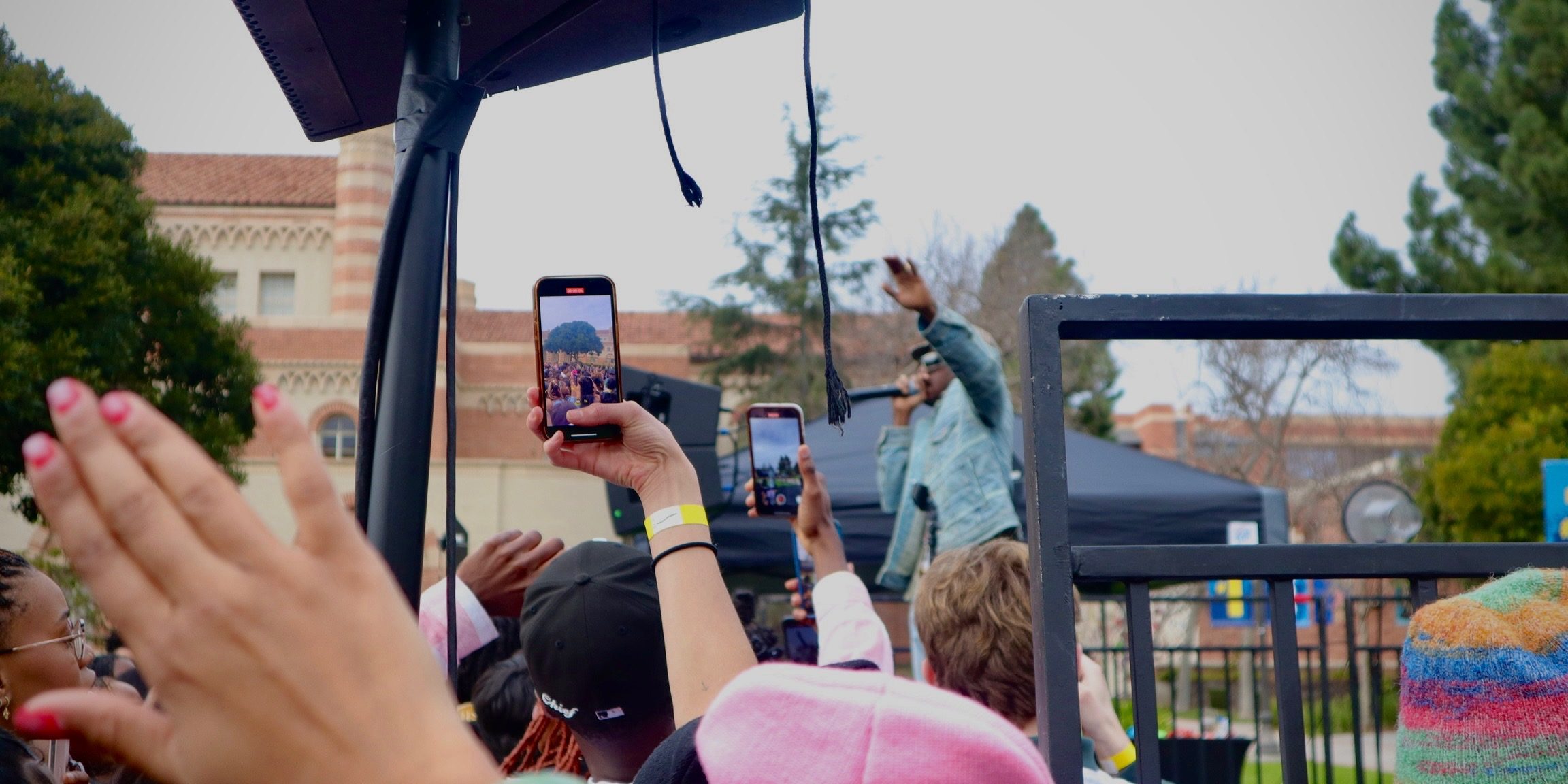Photos by Ria Bose
February 1st marks the beginning of Black History Month—a time of celebration and reflection for the accomplishments and stories of the Black Americans. 2 days following, UCLA’s Nigerian Student Association and Campus Events Commission held the annual AfroFest. On its second run, the event was five hours packed with student vendors, dance performances, and DJing, all culminating with a headliner performance from artist Victony.
Upon entering, it was clear the gloomy weather did nothing to stop the crowds of people from enjoying what the festival had to offer. Student vendors were positioned on the grass next to Wilson Plaza’s crosswalks. Students sold a diverse range of merchandise, from clothing to jewelry to waist chains to pillow cases. AfroFest left little to the imagination of what students of color can create at UCLA. Together, my photographer, Ria, and I’s first goal was to browse among this selection, and we took time to appreciate the creative prowess of each vendor.
Our perusing was short-lived however, as we began to hear shouts from surrounding festival goers to create a circle around the main center of the plaza. Once assimilated, a silence grew over festival attendees, until the only sounds heard were the footsteps of the approaching dancers, all straight-faced and moving in a single file line, then stopping at the center. Finally, the music and movement began.
The energy and pride of the dancers was palpable and the crowd’s focus was solely on NSA’s Dance Team. The dance routine lasted around five minutes, complete with various spot changes and freestyle moments, earning cheers and shouts from the audience. With each song transition, a crescendo of enthusiasm waved over both the crowd and the dancers. The movements became more purposeful as the freestyle segments ended and the dancers returned to a final synchronized sequence–the looks of concentration returning to their faces. Finally, as the performance ended, the crowd erupted into cheers as the dancers took their leave, leaving behind evidence of their passion: a few articles of clothing (two socks and pieces of a skirt), on the ‘dancefloor’.
The festival began to buzz again, as if the performance had breathed new life into the crowd. With this newfound energy, we decided to make our rounds to greet familiar faces around the plaza. In doing so, many conversations about food took place. From what we gathered, the festival provided a food selection ranging from Nigerian food such as jollof rice to African American soul food such as mac n’ cheese and fried chicken (with the addition of Caribbean food like beef patties). Judging by how it was gone within the hour it was put out, the food seemed to be good. Our attention was quickly diverted to the photobooth tucked away in the back of the plaza by the stage, where groups of friends hung out to take a ‘vintage styled’ photo. It was then that we noticed that not only did AfroFest seem to be a place to enjoy food, vendors, and music, but also a fashion show. Many students were dressed to impress–decked out in all leather to all denim, mini skirts to cargo pants, and many found in African soccer jerseys, from Nigeria to Cameroon.
After observing the photo booth, my photographer and I decided to venture closer to the stage as the clock struck closer to the main performances. We shuffled through the crowds of people dressed far better than we were until we found ourselves pressed up against the speakers, our bodies reverberating in tandem with the bass of the afrobeats music playing through them. The DJs had a hold on the crowd as dance circles commenced in front of the stage.
Nearing 4pm, everyone began gearing up for the headliner. After being introduced by DJ (whatever his name is), 23-year-old Nigerian singer-rapper-songwriter Victony walked onto center stage decked out in all denim, sunglasses, and a cool swagger. Victony has a large presence on different platforms, amassing over 1 million followers on Instagram and just under 7 million monthly listeners on Spotify–his hit song “Soweto” generating over 100 million streams. With these stats in mind, it makes sense that the crowd cheered loudly as his performance commenced. Beginning with “Soweto”, Victony played through his hits–blending afrobeats and rap as what looked like a hundred phones pointed towards him.
While Victony was able to entrance the crowd in his own electrifying way, through his large stage presence and transcendent music, it seems that this was not all the festival had in store for us. A few songs into his set, Victony introduced a surprise guest on stage with him; 28-year-old Nigerian rapper and singer Blaqbonez walked on stage and promptly began singing his biggest hits, much to the crowd’s excitement.. It’s no wonder why people were buzzing at such a big artist performing on the very grounds they walk to class every day. There wasn’t a single person not dancing in the crowd–we even caught someone facetiming their friend to show the performance.
Even as the headlining set came to a close and the festival was nearing its end, the crowd did not lose its energy. People remained dancing, singing, or both as Blaqbonez and Victony finished their sets together.
Only being on its second run here at UCLA, AfroFest has quickly become an important space for Black students to be able to celebrate their heritage, and for non-Black students to be able to appreciate it. From music to clothes to food, African culture weaves itself into our everyday lives, and events like AfroFest give us the opportunity to grow more aware of this.




